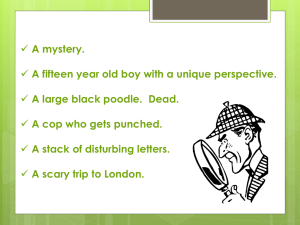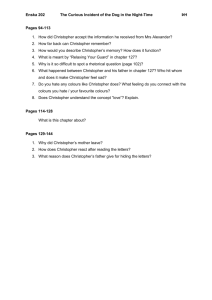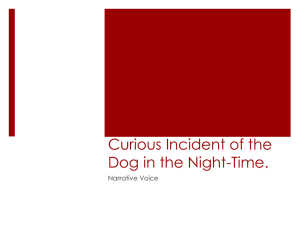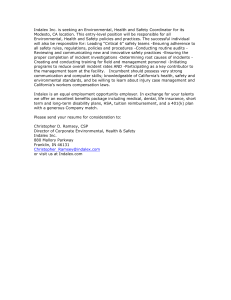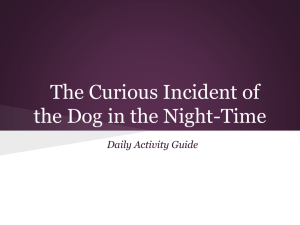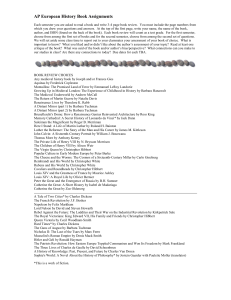The Curious Incident of the Dog in the Night-time
advertisement
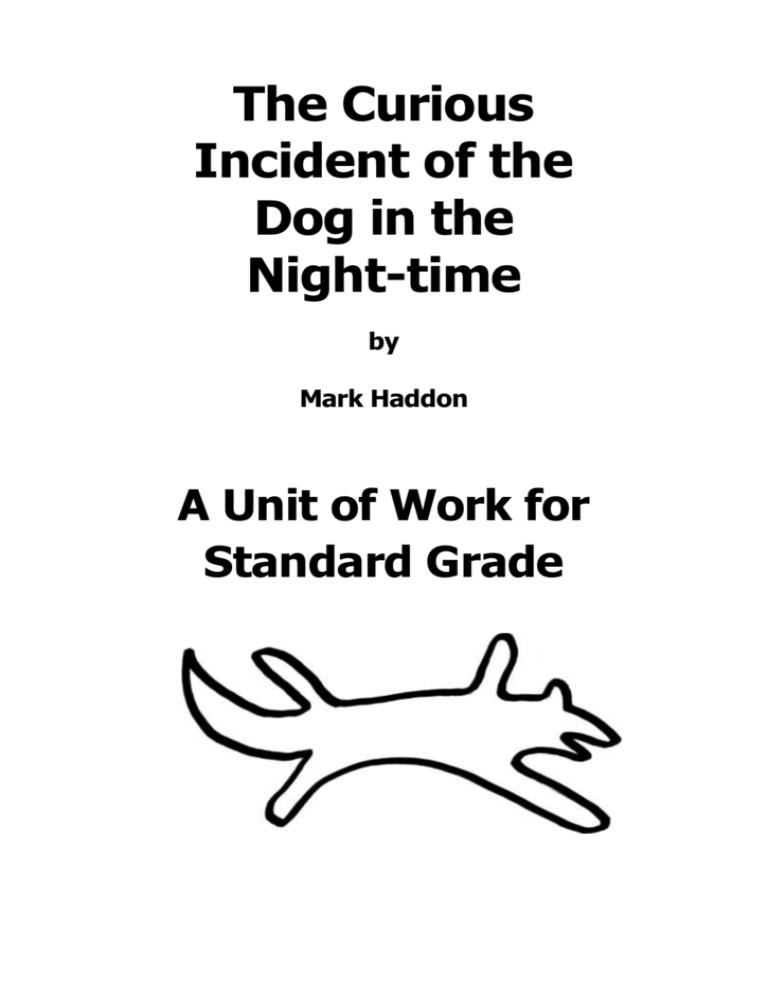
The Curious Incident of the Dog in the Night-time by Mark Haddon A Unit of Work for Standard Grade HANDBOOK: ASPERGER'S SYNDROME What's it like? 1. 2. 3. 4. Imagine not knowing why people are laughing at you; imagine being called' odd'. Imagine a world where you did not understand jokes, idioms, metaphors and expressions such as: Pull your socks up, lake the bull by the horn, catch you later, that's cool, as flat as a pancake, pick up your ideas. Someone asks if you want more chips. You answer, how many? Imagine not knowing why everyone laughs. Imagine your favourite room at home where everything is placed just as you want it. You know where everything is. It has always been like that. Now imagine going home to find that someone has changed everything around without your knowledge. You have to adapt to the change, everything is in a different place from usual. You find this extremely distressing. What is it? 5. 6. 7. 8. Asperger's syndrome is a form of autism. Autism includes a range of developmental disabilities not caused by psychological factors. Those with Asperger's syndrome display an impairment in social interaction, imagination, and flexible thinking. They process incoming information inappropriately. Their brain's ability to take in, store and use information, results in a somewhat unusual perspective on the world. Unlike autism, the cognitive and communicative development of those with Asperger's syndrome are within the normal or nearnormal range in the first years of life. However, they do not learn social rules despite observing the behaviour of others or receiving frequent reminders. They have difficulty with abstract concepts and often take language literally. A weakness in processing information auditorily may result in behaviour that seems rude. Those with Asperger's syndrome typically exhibit highly articulate and verbose language skills. They tend to rote learn and therefore each piece of information remains disconnected. They find it difficult to make small talk, and talk at people rather than to them. There may be a lack of awareness of the need to take turns when talking and difficulty in interpreting body language, facial 9. 10. expressions, gestures and vocal volume. Eye contact may be avoided. Students with Asperger's cannot conceptualise or appreciate others' thoughts and feelings and may have a primitive or non-existent sense of humour. They can be obsessively tidy and take up idiosyncratic interests such as trains, cookers, or car number plates. Learners with Asperger's syndrome can have low self esteem. Other difficulties such as dyslexia or epilepsy may be present. Asperger's syndrome is not rare and it is likely that there will be some students with this syndrome in every school, college and university. The disorder is found more frequently in males than in females. Students' voices The following comments are typical of the experiences of students with Asperger's syndrome. I often find people laughing at me but I am not sure why. I make people cross. I laughed when we were told that Mr. Davis had died but I don't know why I did that. Mrs. S. said she would see me this afternoon but she didn't. She shouldn't say things she doesn't mean. Mr. K. and I have an agreement. He holds up his thumb sometimes. This is a sign for me. I have to do the same if I am OK. Sometimes he doesn't hold up his thumb when I am not OK. I have to point my thumb down when that happens. He comes and talks to me. I have lots of friends. They are all at college. There are a lot of friends I have never spoken to. They don't know me. I don't know the name of all my friends as there are too many. I learnt the names of everyone in the chemistry class so I have more friends there. You should know the names of your friends. If I am more that 80% not happy I can sit at a table at the back. It faces the wall. It is my space. I do not want anyone else in my space. One day there were cups and saucers in my space. I threw them on the floor. I was 100% not happy. Mr. D said I was right to be cross about my space but I should put anything that shouldn't be there on his desk next time. He said that I should check and clear my space at the start of each lesson. I do that. I made a notice for my space. I called it 'Peter's Zone.' Someone changed it to Parazone. I think it was a friend. I left it. Mr. D said think of it as a nice clean corner but I don't know why he said that.' To be honest I think I do have obsessions with mechanical things and I read about them when I can. It becomes very annoying when I'm told I can't. I feel I learn very quickly but in my own way. Implications for learning Approach to learning Students with Asperger's syndrome have a weakness in processing information through hearing (auditory processing) and need to write instructions down (visual processing). They tend to rote learn and therefore each piece of information remains disconnected. Individual assignments are preferred to pair or group work. Students usually prefer to work on their own, or they may have a tendency to take control of group situations according to their own understanding of social rules. Classroom behaviour Students may keep repeating the same question until they have worked out the answer. They often rely on strict routines and do not adapt to change easily (for example, always wanting to sit in the same seat, or feeling unsettled by a change in teacher or room). Students may need someone to deal with what appear to be unimportant concerns, for example why the blinds are pulled down, or why they are to watch a video. They may become anxious when the situation is not predictable or clear. Language, understanding and application of knowledge Students with Asperger's syndrome typically exhibit highly articulate language skills. These are not necessarily advanced communication skills, and may be echolalic (repetitive) speech or learned phrases which are repeated as if they are their own. Students may have trouble interpreting analogies, or transferring knowledge from one context to another. They may have difficulty in retelling stories or events in a cohesive and sequential manner. and significant events may be recalled alongside the trivial. They may develop areas of intense interest that are not directly related to their study. ‘The Curious Incident of the Dog in the Night-time’ by Mark Haddon TASK 1 Read page 1 of the novel. Think – Pair – Share for what you notice about the language/style of the opening. What do you find unusual or intriguing? TASK 2 Read to the end of Chapter 37 (page 25). The main character of the novel, Christopher Boone, has autism. After reading the first 25 pages, compile a list of Christopher’s character traits that you think could be attributed to his condition. Consider: His language How he interacts with other people His understanding of social conventions His understanding of the world Anything else that you find worthy of a mention! TASK 3 Continue reading to the end of Chapter 73 (page 61). Compare Christopher’s ‘Behavioural Problems’ list to the list that you compiled earlier. How are the two similar? TASK 4 Read to the end of Chapter 79 (page 64). Imagine you are Christopher’s father. Write a diary entry explaining how you feel at this point in the novel. Consider: How you feel about Christopher’s condition and how you cope with it Your annoyance over Christopher’s obsession with who killed Wellington Why you feel angry What it’s like being a single-parent with an autistic son Remember to set the diary out appropriately, using the date and ‘Dear Diary’ at the start. TASK 5 Chapter 97 (pages 69 – 77) is a turning point in the novel. a) Explain what a turning point is. b) Why do you think Chapter 97 is a turning point? c) Continue the chapter, writing in the style of Mark Haddon from Christopher’s point of view. Consider: What does Christopher do with the new knowledge about his mum and Mr Shears? Does Christopher’s dad find out about the conversation with Mrs Anderson? Make sure that you use a similar style of language to Christopher to make it convincing. TASK 6 ‘Mr Jeavons said I liked maths because it was safe. He said I liked maths because it meant solving problems, and these problems were difficult and interesting, but there was always a straightforward answer at the end. And what he meant to say was that maths wasn’t like life because in life there are no straightforward answers at the end.’ Write about a difficult time in your life when you found that there were no ‘straightforward answers’. Remember to include your thoughts and feelings. TASK 7 Read Chapter 113 (pages 96 – 99). Christopher claims to have a good memory. He uses an extended metaphor to explain this. a) Explain what an extended metaphor is b) What extended metaphor does Christopher use to describe his memory? c) How effective do you find this metaphor? Writing Choose one of the following tasks: a) Write about a childhood memory that you have. Describe it in such a way that it becomes ‘real’ to the reader and explain why it is an important memory for you. b) What would you do if you hadn’t …? (page 98) c) What would I say to ________ if s/he was here now? Read Chapter 127 (pages 100 – 104) and answer the following questions in your jotter. 1. Write down three things that Christopher did when he got home from school. 2. In your own words explain what the Blue Planet video was about. 3. Why do you think Christopher likes to imagine that he is there in the ‘deep blue’? 4. What technique does Mark Haddon use to describe the rust on the advert for milk powder (Paragraph 4)? What does it tell you about the circles? 5. Why do you think Christopher finds rhetorical questions difficult to spot? 6. Christopher’s father is clearly angry when he speaks to Christopher about the book. How do we know this? 7. ‘It was like someone had switched me off and then switched me on again.” (p103) What technique has been used here and what does it tell you about Christopher? 8. What do you think happened when Christopher lost his memory? Use evidence from pages 103 and 104 to support you. TASK 8 On page 102, Christopher talks about rhetorical questions. A Rhetorical question is a question to which no answer is really expected; it may have the effect of a strong statement. Consider the effects of the following rhetorical questions: a) How stupid are you? (page 102) b) What time of night do you call this? c) Few vehicles are built more solidly than the Porsche 924S. Fuel economy? Outstanding. Re-sale values? Reassuringly high. d) I woke up with a head like a rodeo. Isn’t it painful having fun? e) Are you deaf? I feel as though I’m talking to a brick wall. f) Shall we relax our efforts at the very moment when victory is in our grasp? g) Do you want to be rich? Play the National Lottery. h) Is it nice being perfect? Read Chapter 163 (Pages 145 – 148) and answer the following questions in your jotter. 1a) The opening of Chapter 163 is surprising. What does the reader expect the chapter to be about? 1b) Explain how it is different to your expectations. 1c) Why do you think Mark Haddon chose to start the chapter in this way? 2) ‘That was because when I was little I didn’t understand about other people having minds.’ How does the anecdote described in the previous paragraph help to clarify the idea in the above quote? 3) ‘But the mind is just a complicated machine’. What technique has been used here and how effective is it? 4) In your own words explain how, according to Christopher, people are different to animals. 5) Explain the purpose of the brackets on page 148. 6) What is the function of the last paragraph in this Chapter (page 148)? (Hint: Why is Christopher referring to his feelings?) TASK 9 Read Chapters 149 and 151 (pages 114 – 128). What techniques has Mark Haddon used to build up tension in these chapters? How does he manage to evoke sympathy for Christopher? Fill in the grids in your jotter. Sympathy Technique Eg. Christopher tells Siobhan how he got the bruise. He explains in an innocent, matter-of-fact way that his father hit him. Page Page 114 Quote “I said that father was angry and he grabbed me so I hit him and we had a fight.” Tension Technique Page Eg. Use of a short sentence to create a sense of mystery. Page 114 Quote “But my book wasn’t in the dustbin.” TASK 10 Mark Haddon often includes maps and diagrams in the novel to show how Christopher needs to visualise things in order to understand them. Look at the diagrams on pages 162 and 163. How do they help Christopher to make his difficult decision? Find two more examples where maps or diagrams are used in the novel. Explain their context and discuss their significance for Christopher. TASK 11 Read Chapter 191 (Pages 179 – 191). How does Mark Haddon use sentence structure to reflect Christopher’s state of mind? Without paying any attention to accuracy, write about a time in your life when you were frightened. Try and block everything else out of your mind and write as quickly as you can. Now go back and look over your work. Do your sentences and the words chosen reflect your state of mind? Task 12 Read Chapter 197 (Pages 196 – 202). Imagine that you are the policeman who dealt with Christopher in this chapter. Write a script in which you explain what happened to either your sergeant or to Christopher’s dad. Remember that they probably won’t be too impressed by the fact that you lost Christopher! Task 12 Read Chapter 211. What do the descriptions of the signs on pages 208 and 209 reveal about Christopher’s state of mind at this point in the novel? Task 13 Read Chapter 227. Analyse the techniques used by Mark Haddon to build tension in the novel. At the end of this chapter, which character(s) do your sympathies lie with? Justify your answer with close reference to the text. Critical Essay Explore the techniques used by Mark Haddon to convey the main character’s autism in ‘The Curious Incident of the Dog in the Nighttime'’ Suggested structure: Introduction Give a brief explanation of who wrote the novel and what it is about. Make sure that your explanation is relevant by referring to autism. Paragraph 2 Write about the narrative style (first-person) and the effects. You might wish to mention the language style, especially sentence structure. Paragraph 3 Aspects of plot are important in understanding Christopher’s autism. Discuss his need for the truth. Why doesn’t he lie? Paragraph 4 Talk about the dead dog. This symbolises Christopher’s need to discover the truth, which is why he decided to write the book. When he sets out to discover who killed Wellington he makes the devastating revelation that it was his own dad. What impact did this have on Christopher? Paragraph 5 From this point on, Christopher is unable to trust his Dad. How is this made worse when he discovers the truth about his mother? How does Mark Haddon manage to evoke sympathy for Christopher? Paragraph 6 Numbers/maths help Christopher to cope with what is essentially a confusing world. Discuss this. Contrast his grasp of maths to his lack of understanding of some aspects of language (eg metaphors) and social behaviour. Paragraph 7 Maps and diagrams are often used in the novel as they help Christopher to visualise his place in the world. Give an example and talk about the impact on the reader. Conclusion Evaluate how effective Haddon’s creation of Christopher was. Did you believe that he was autistic? Has the book taught you anything? As usual, you need to aim for 800 words. Make sure that your essay has been written clearly and that it focuses on the question. All of your main points should be supported by quotations from the text. Check through for accuracy before handing it in. Good luck!
